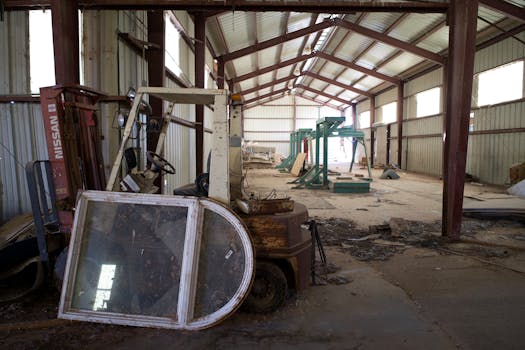You could do a forklift truck operations training course at a college, which would teach you some of the skills you need in this job.
Entry requirements
Entry requirements for these courses vary.
View this career for different education levels:
A forklift operator is responsible for moving goods and materials safely around warehouses, factories, construction sites, and storage yards using specialised lifting equipment. This role involves loading and unloading deliveries, stacking goods, and ensuring items are stored correctly and securely. Forklift operators must have good attention to detail, follow health and safety regulations, and perform routine checks and maintenance on their equipment. The job can involve working shifts, including evenings and weekends, particularly in large distribution centres or busy periods such as Christmas.

Forklift operators in the UK typically earn between £19,000 and £28,000 per year, depending on experience and location.
There were over 33,000 forklift operator positions advertised in the UK in 2023, with high demand in logistics and warehousing sectors.
Most positions require a valid forklift licence, which can be achieved through accredited training courses lasting from 3 to 5 days.

Operates reach trucks to move goods in and out of high racking systems within a warehouse environment.

Uses telescopic handlers to lift and transport materials around building and construction sites.

Handles forklift operations in refrigerated warehouses, dealing with perishable goods and maintaining safety in cold environments.
Learn what a forklift operator does day to day, including the typical working environment and key responsibilities.
You can find information by visiting manufacturing company websites, watching videos about forklift operation, or reading job listings. Consider speaking to someone in the role if possible to get a real-life perspective on the job.
Find out what qualifications, skills, and personal attributes are needed to become a forklift operator.
Most employers look for good attention to detail, safety awareness, and strong communication skills. Physical fitness is also important as the role may involve lifting and being on your feet for extended periods.
Complete an accredited forklift operator training course, which teaches you how to safely operate forklifts.
Courses are offered by private training providers, colleges, and some employers. Training usually includes both classroom learning and hands-on practical experience. You will learn about health and safety regulations, different types of forklifts, and how to manoeuvre loads safely.
Pass the practical and theory tests to receive your forklift licence or certificate.
Accrediting bodies in the UK include ITSSAR, RTITB, and NPORS. After passing, you will receive a certificate showing you are qualified to operate specific types of forklift trucks. Keep your certificate up to date by attending refresher courses as needed.
Search for forklift operator vacancies at warehouses, manufacturing companies, and logistics firms.
Check job websites, company career pages, and local recruitment agencies. Entry-level roles may be advertised as warehouse operative or forklift driver. Make sure your CV highlights your forklift training and any relevant experience.
Start working as a forklift operator and continue learning on the job.
You will develop your skills further by working under supervision and following company procedures. Over time, you may be able to progress to more advanced roles, such as team leader or supervisor, or learn to operate other types of machinery.
Explore relevant apprenticeships that can help you kickstart your career in Forklift Operator. Apprenticeships offer hands-on experience and training while earning a wage.
This page showcases various career options and the pathways to reach them. Each career listed here shares transferable skills and knowledge, making it easier for individuals to transition between them.
Your current career is highlighted to help you see how it fits into the broader landscape of potential career choices. By clicking on any career, you can learn more about it, including the training and education required to pursue it.
Remember, progressing in your career often involves further learning and training. This page provides insights into future career options as well as those that can lead up to your current one.
These career progression decisions are informed by comparing the skills and knowledge needed for different occupations, along with data on how people move between them. Explore the possibilities and discover the exciting journey ahead in your career!
The role of a Forklift Operator closely matches that of a Forklift driver as both involve operating similar types of lift trucks to move and handle goods or materials within warehouses, construction sites, or ports. The qualifications and skills required are similar, focusing on safe driving, operational efficiency, and adherence to health and safety regulations.
You can get into this job through:
You could do a forklift truck operations training course at a college, which would teach you some of the skills you need in this job.
Entry requirements for these courses vary.
You could apply to do a Supply Chain Warehouse Operative Level 2 Intermediate Apprenticeship.
You should check with the company you apply to whether their apprenticeship includes forklift training.
Employers will set their own entry requirements.
You can apply directly for jobs. Some employers may ask for GCSEs, including English and maths.
You'll have an advantage if you've completed forklift training, though your employer may put you through training when you start work.
Experience of loading and unloading goods and materials in a warehouse, in freight transport or on a building site would be useful.
Make sure you get a copy of your forklift training completion certificate so you can use it for job applications. Unlike a driving licence, there is no forklift licence as such, though some job adverts may refer to the completion certificate as a 'licence'.
You can find out more about working as a forklift driver in construction from Go Construct.
You can find details of approved forklift training providers through the Accrediting Bodies Association - Workplace Transport.
Explore other careers or use our AI to discover personalised paths based on your interests.
Address
Developing Experts Limited
Exchange Street Buildings
35-37 Exchange Street
Norwich
NR2 1DP
UK
Phone
01603 273515
Email
[email protected]
Copyright 2026 Developing Experts, All rights reserved.
Unlock expert-designed lessons, resources, and assessments tailored for educators. No credit card required.
Claim Your Free Trial →